In recent decades, the landscape of digital marketing has undergone a profound transformation, shifting from traditional physical media to the realm of digital platforms.
The rise of search engines has significantly expanded the avenues for marketing specific websites, particularly through strategies aimed at enhancing topical authority SEO. However, this surge in marketing opportunities has also led to intensified competition, with an unprecedented number of businesses vying for attention in today’s crowded online marketplace.
Understanding Topical Authority:
In the realm of SEO-driven marketing strategies, familiarity with search engine algorithms is paramount. As you delve into optimizing your online marketing tactics for Google’s search algorithm, you’re likely to encounter the concept of “topical authority.” If you’re unfamiliar with this term, fear not – there’s no better time than now to delve into its significance.
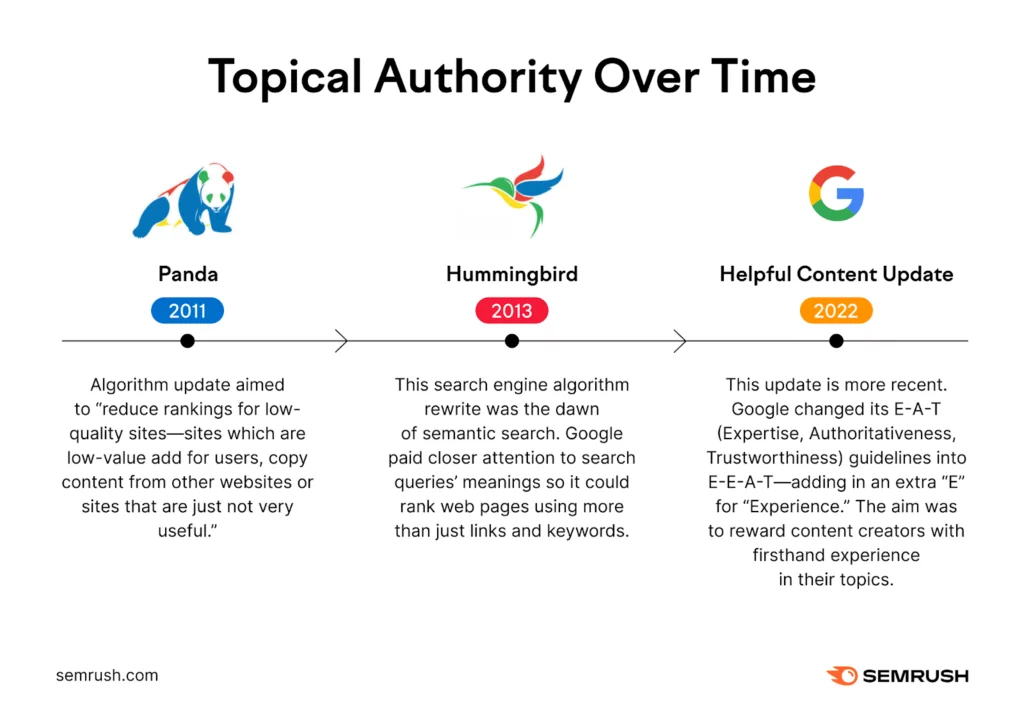
Topical authority serves as a gauge of a website’s credibility as a reliable source of information within a particular niche. Essentially, it reflects the degree of preference afforded to content-based pages based on their accuracy and quality of information.
Content that is deemed high-quality and offers accurate insights into a specific topic is more likely to earn a higher ranking and be recognized as a trusted resource by search engines. Websites with greater topical authority are thus positioned to secure higher rankings compared to those with lesser authority.
Key to understanding topical authority is the sustained delivery of high-quality content over time, spanning a range of supporting articles. This consistent content excellence enhances the likelihood of rapid ranking advancement, distinguishing the website as an authoritative voice within its niche. A robust content portfolio that regularly addresses related topics further bolsters a site’s topical authority.
Benefits of High Topical Authority:
Building topical authority can significantly benefit your website in various ways, ultimately contributing to its overall success in the competitive digital landscape. Let’s delve into the specific advantages of establishing topical authority:
- Higher Organic Traffic: One of the primary goals of any website is to attract more visitors, and topical authority can play a crucial role in achieving this objective. By establishing yourself as an authority in your niche, you increase your chances of ranking higher in Google search results. This elevated ranking translates into greater visibility and exposure to your target audience, leading to a surge in organic traffic. As more users discover and engage with your content, your website’s reach expands, potentially attracting a larger pool of potential customers.
- Improved Brand Reputation: Consistently producing high-quality content on a specific topic elevates your credibility and reputation within your industry. As users encounter your content at the top of search results, they perceive you as a trusted source of information and expertise. This enhanced brand reputation not only fosters trust among your audience but also positions you as a go-to authority in your field. Consequently, your brand gains recognition and respect, driving increased user interaction and engagement with your content.
- Higher Backlink Count: A key indicator of a website’s authority and credibility is its backlink profile. As your website’s visibility and reputation grow, other websites within your industry are more likely to link to your content. These backlinks serve as endorsements of your expertise and further validate your authority on the topic. Moreover, Google’s algorithms consider backlinks as a crucial ranking factor, meaning that a higher backlink count can contribute to improved search engine rankings. By establishing topical authority, you not only attract more backlinks but also enhance your website’s overall authority and relevance in the eyes of search engines.
Best Practices to Enhance Topical Authority:
A. Develop a robust content strategy:
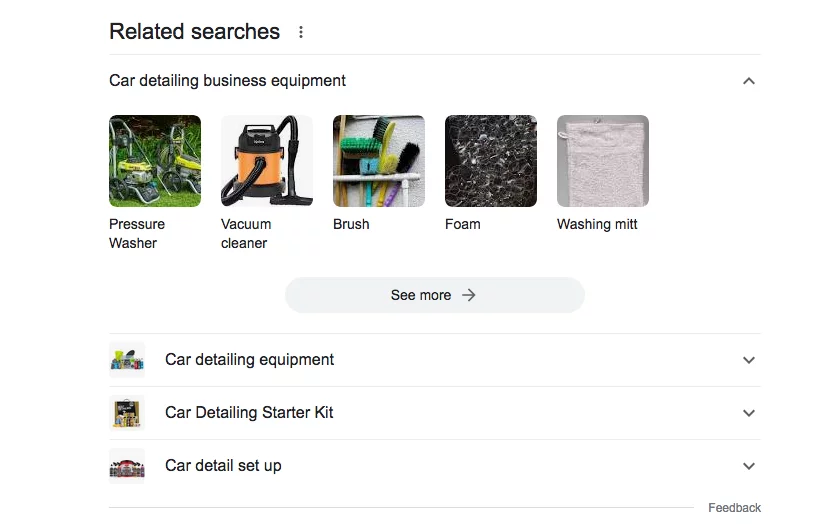
Creating a robust content strategy is essential for establishing topical authority and positioning your website as a trusted source of information within your niche. Let’s explore the three crucial steps involved in crafting an effective content strategy:
- Planning: Planning lays the foundation for your content strategy by defining its purpose and objectives. Start by clearly outlining the goals your content aims to achieve, whether it’s increasing brand awareness, generating leads, or educating your audience. Understanding your goals will help you tailor your content to meet specific objectives effectively. Once you’ve established your goals, it’s time to identify the types of content that will best serve your purpose. Different user intents require different content formats, so conduct thorough research to determine the most suitable content types for your target audience. Whether it’s blog posts, videos, infographics, or podcasts, choose content formats that resonate with your audience and align with your objectives.
- Research: Research forms the backbone of your content strategy, providing valuable insights into your target audience’s preferences, interests, and pain points. Start by conducting keyword research to identify relevant topics and search terms related to your niche. Use keyword research tools to uncover popular search queries and trending topics, giving you a comprehensive understanding of what users are searching for.Additionally, leverage social media platforms to gather insights into your audience’s discussions, questions, and feedback. Analyze relevant posts and discussions to identify emerging trends, common pain points, and areas of interest within your niche. This social listening process can provide valuable inspiration for creating content that addresses your audience’s needs and interests effectively. Don’t overlook the importance of exploring the “People Also Ask” section in Google search results, which provides insights into common user queries and topics of interest. Utilize SEO tools that offer structured data on related search queries to further refine your content strategy and ensure alignment with user intent.
- Focus on Your Niche: With millions of web pages competing for attention, it’s essential to carve out a niche for your content and establish yourself as an authority within that space. Avoid diluting your content with irrelevant or unfocused information, as this can undermine your credibility and topical authority.Instead, focus on producing high-quality, unique content that addresses specific topics and caters to your target audience’s interests and needs. Target related search queries and niche-specific topics to differentiate your content from competitors and attract relevant traffic to your website. Prioritize user engagement and retention by delivering valuable, informative content that addresses common pain points and provides actionable insights. By consistently delivering high-quality content tailored to your niche, you can gradually build topical authority and establish your website as a go-to resource within your industry.
B. Create topic clusters
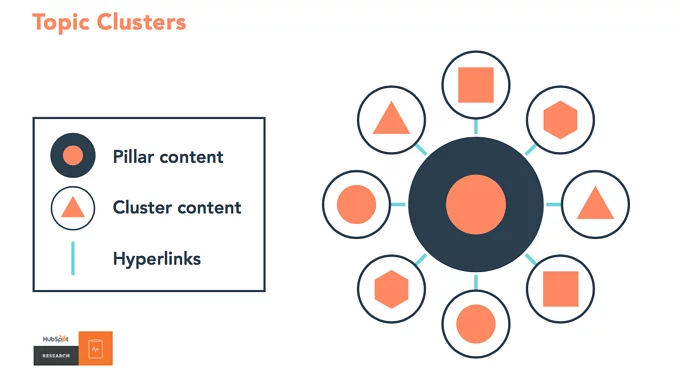
Building intricate topic clusters is a strategic approach to enhancing topical relevance and establishing authority within your chosen niche. Let’s delve into the intricacies of creating topic clusters and how they contribute to building topical authority:
- Identifying Core Topics:The first step in building topic clusters is identifying core topics that are central to your niche or industry. These core topics should represent broad themes or subjects that are relevant to your target audience and align with your content strategy objectives. Conduct keyword research and audience analysis to identify key topics that resonate with your audience and have the potential to drive traffic and engagement.
- Creating Pillar Content:Once you’ve identified core topics, create pillar content that serves as the cornerstone of each topic cluster. Pillar content pieces are comprehensive, in-depth resources that provide authoritative coverage of a particular topic. These pillar pages serve as the primary hub for each topic cluster and are optimized to rank well in search engine results for relevant keywords.
- Developing Supporting Content:With pillar content in place, it’s time to create supporting content that expands upon the core topics and adds depth to the topic clusters. Supporting content pieces should address specific subtopics, related questions, or niche aspects within the broader theme covered by the pillar page. These content pieces complement the pillar content and help to reinforce topical relevance across the cluster.
- Interlinking and Cross-Referencing:An essential aspect of building topic clusters is interlinking and cross-referencing between related content pieces within the cluster. Linking between pillar content and supporting content creates a cohesive network of interlinked pages that signal to search engines the depth and breadth of your topical coverage. This internal linking strategy not only improves user navigation but also strengthens the topical authority of your website.
- Expanding Topic Coverage:As you continue to develop your content strategy, aim to expand the coverage of your topic clusters by addressing additional subtopics and niche areas within your niche. By consistently producing high-quality content that addresses diverse aspects of your core topics, you demonstrate expertise and authority in your field, further enhancing your topical relevance.
- Monitoring and Iterating:Building topic clusters is an ongoing process that requires monitoring and iteration to ensure continued relevance and effectiveness. Monitor the performance of your content clusters using analytics tools to track key metrics such as traffic, engagement, and search rankings. Based on the insights gathered, refine your content strategy, update existing content, and create new content to address emerging trends and user needs.
C. Understand user intent
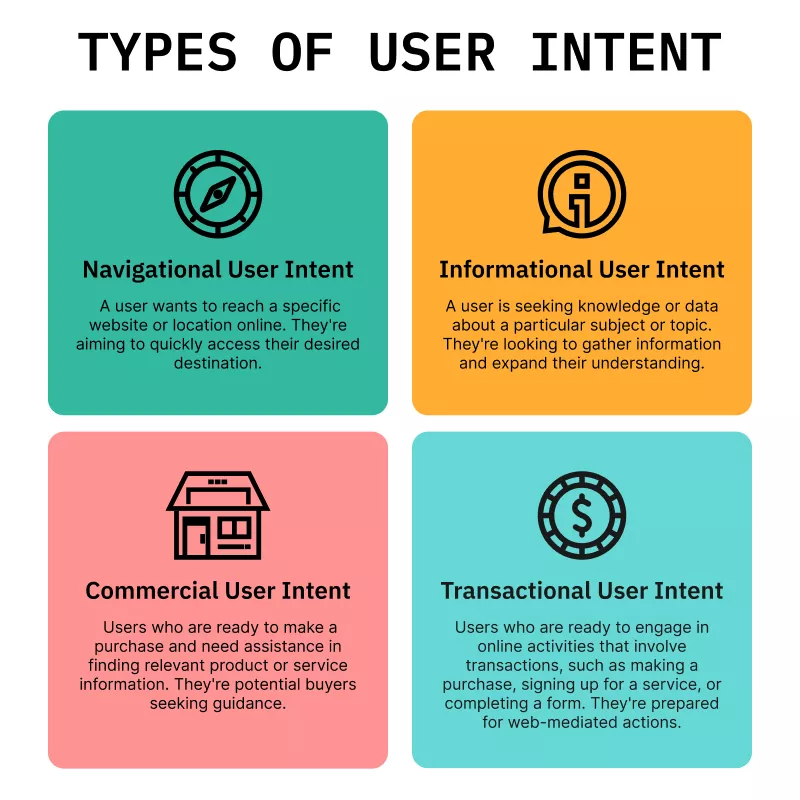
Recognizing user intent is paramount in crafting a successful topical authority strategy. Google’s algorithm has evolved to decipher the underlying intent behind user search queries, emphasizing the importance of aligning your content strategy with user search intent.
Tailoring your content to address specific user intents is crucial for enhancing your website’s relevance and visibility in search results. For instance, creating informative articles to satisfy informational queries or producing buying guides to cater to transactional queries can help capture user interest and drive engagement.
Additionally, cultivating a robust backlink profile from authoritative and relevant websites can significantly boost your website’s topical authority. By strategically linking to reputable sources with high topical authority, you can enhance your own website’s credibility and visibility in search rankings.
There are various tactics to acquire high-quality backlinks, such as guest blogging, collaborating with influencers, or leveraging SEO tools to identify authoritative websites for outreach. Both outbound and inbound external links play a vital role in augmenting backlink quality and reinforcing topical relevance across your content.
How to Assess if a Website Has Topical Authority:
Determining whether a website possesses topical authority may seem daunting at first due to the lack of a precise definition. However, there are several indicators that can help you assess a website’s level of topical authority. Let’s explore these key criteria in detail:
- Strong Internal Linking Profile: Websites with robust internal linking structures often exhibit high topical authority. By analyzing internal links using specialized tools, you can identify pages that are frequently linked to from other content. This interconnectedness signals to search engines that the website covers a particular topic extensively, thus enhancing its visibility in search results.
- Domain Authority (DA) or Domain Rating: Domain authority, measured on a scale from 1 to 100, gauges a website’s strength in search engine rankings. Websites with higher DA scores are more likely to rank prominently on search engine results pages (SERPs). It’s essential to benchmark a website’s DA score against competitors within the same niche rather than fixating on achieving a specific numerical value. Factors influencing DA include the quantity and quality of backlinks, with established domains typically boasting higher scores.
- Keyword Rankings: A website’s topical authority is often reflected in its keyword rankings. Higher rankings for relevant keywords indicate a comprehensive coverage of a particular topic. Utilizing keyword research tools can help identify trending topics and bridge any gaps between your website’s content and that of competitors. However, maintaining a unique voice and delivering valuable content to users should remain a priority.
- Content Quality: Consistently publishing well-researched, high-quality content is a hallmark of websites with high topical authority. Engaging articles that offer valuable insights to readers contribute to enhanced user engagement and retention. While content quality is crucial, it should be complemented by other factors such as internal linking, domain authority, and keyword optimization to achieve optimal SERP rankings.
Real LIfe Examples of Topical Autority in Websites:
1. Monday.com– A Pioneer in Project Management

Monday.com has achieved remarkable success in the realm of project management, drawing in an impressive 1.2 million monthly organic visitors to its website. A pivotal strategy contributing to their triumph is their meticulous organization of content, segmented into various industries or sub-niches. This strategic approach not only facilitates the establishment of topical authority but also enhances user experience by catering to specific audience needs.
Key Features:
- Industry-Specific Content Organization: Monday.com curates content tailored to different industries, creating dedicated hubs where users can find relevant resources and insights. This approach ensures that users can easily access information pertinent to their field, enhancing engagement and retention.
- Comprehensive Project Management Hub: As an example of their targeted content organization, Monday.com offers a dedicated project management hub. Here, users can discover a wealth of valuable resources, updates, and tips tailored specifically to project management professionals.
- Keyword Domination: By focusing on niche topics within the project management space, Monday.com has achieved significant success in search engine rankings. They have secured the top position for competitive keywords like “project management software” and attained the third spot for the highly sought-after term “project management.”
- Expertise Demonstration: Through their curated content hubs and authoritative resources, Monday.com showcases their expertise and industry knowledge. This not only attracts organic traffic but also establishes trust and credibility among their target audience.
2. RetroDodo- Dominating Niche Gaming
RetroDodo has emerged as a standout example of how a website with a modest backlink profile, boasting a Domain Rating (DR) of 47, can achieve remarkable success. With over 1 million monthly clicks and generating over $50,000 in monthly revenue, RetroDodo’s ascent to dominance in the niche gaming sector is nothing short of impressive.
Key Features:
- High Topical Authority: Despite its relatively weak backlink profile, RetroDodo has established itself as a leading authority in the niche gaming market. Through strategic content creation and optimization, they have cultivated a strong topical authority that resonates with their target audience.
- Topic Clusters: A pivotal aspect of RetroDodo’s success lies in their implementation of topic clusters. By organizing content around specific themes or keywords, such as “retro handhelds,” they effectively capture the interest of their audience and establish themselves as a go-to source for niche gaming enthusiasts.
- Visual Breakdowns: RetroDodo enhances user engagement by providing visual breakdowns of their topic clusters. These visual representations offer a clear and concise overview of the content, making it easier for users to navigate and explore relevant topics.
- SEO Case Studies: RetroDodo’s commitment to transparency and knowledge-sharing is evident in their SEO case studies. By delving into their strategies and successes, they not only showcase their expertise but also provide valuable insights for others looking to replicate their achievements in the niche gaming sphere.
3. Typeform – Trailblazer in Survey-Related Keywords
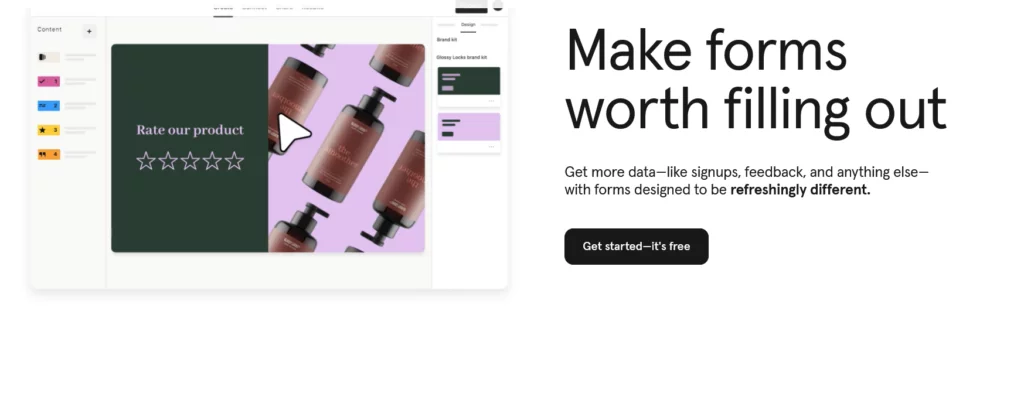
Typeform has firmly established itself as a dominant force in the competitive landscape of survey-related keywords. With numerous survey software tools vying for top rankings in search engine results, Typeform has managed to rise above the competition through strategic initiatives and innovative approaches.
Key Features:
- Comprehensive Survey Templates: Typeform sets itself apart by offering a vast array of survey templates tailored to various use cases. This extensive library of templates caters to the diverse needs of users across different industries and sectors, providing them with ready-to-use solutions for their survey projects.
- Topical Authority Building: Typeform’s strategy extends beyond merely offering survey templates. They have strategically targeted top-of-the-funnel keywords and implemented topic clusters to solidify their topical authority in the survey software niche. By creating authoritative content that addresses a wide range of survey-related topics, Typeform has positioned itself as a go-to resource for individuals and businesses seeking survey solutions.
- User-Friendly Interface: Typeform’s user-friendly interface makes it easy for users to create, customize, and deploy surveys without the need for extensive technical knowledge. The intuitive design and drag-and-drop functionality streamline the survey creation process, enhancing user experience and satisfaction.
- Innovative Features: Typeform continuously introduces innovative features and functionalities to meet the evolving needs of its users. From advanced question types to interactive elements, Typeform empowers users to create engaging and dynamic surveys that yield valuable insights.
- Analytics and Insights: Typeform provides robust analytics and reporting capabilities, allowing users to track survey performance, analyze responses, and gain actionable insights. These analytics enable users to make data-driven decisions and optimize their survey strategies for maximum impact.
Conclusion:
Topical authority websites play a crucial role in providing valuable and authoritative content on specific subjects, catering to the needs and interests of targeted audiences. By focusing on a particular niche or topic, these websites establish themselves as go-to sources of information, earning trust and credibility among users.Furthermore, topical authority websites often foster communities of like-minded individuals, facilitating discussions, sharing experiences, and building connections around shared interests. This sense of community strengthens the website’s influence and reinforces its position as a trusted resource within its niche.
FAQs on Topical Authority:
How is topical authority measured?
While topical authority in SEO lacks a direct definition, there are methods to gauge it. One approach is to utilize tools like Ahrefs’ Keywords Explorer and analyze the “Traffic share by domains” report. This involves entering a high-volume keyword, filtering the matching terms, exporting the results, and assessing the traffic share by domains to determine if content with more authority is needed.
What is the difference between topical authority and domain authority?
Topical authority focuses on a website’s expertise and relevance within specific topics, while domain authority evaluates the overall strength and trustworthiness of a website. Google prioritizes topical authority for audience engagement, whereas domain authority is comparative and relies on factors like website age, trust level, and user traffic.
How does topical authority affect SEO?
Topical authority plays a crucial role in SEO by optimizing website content for expertise, authority, and trustworthiness. High-quality content covering a range of topics establishes a positive reputation, leading to topically relevant keywords being associated with the brand and higher rankings on SERPs. This drives increased user traffic and engagement.



